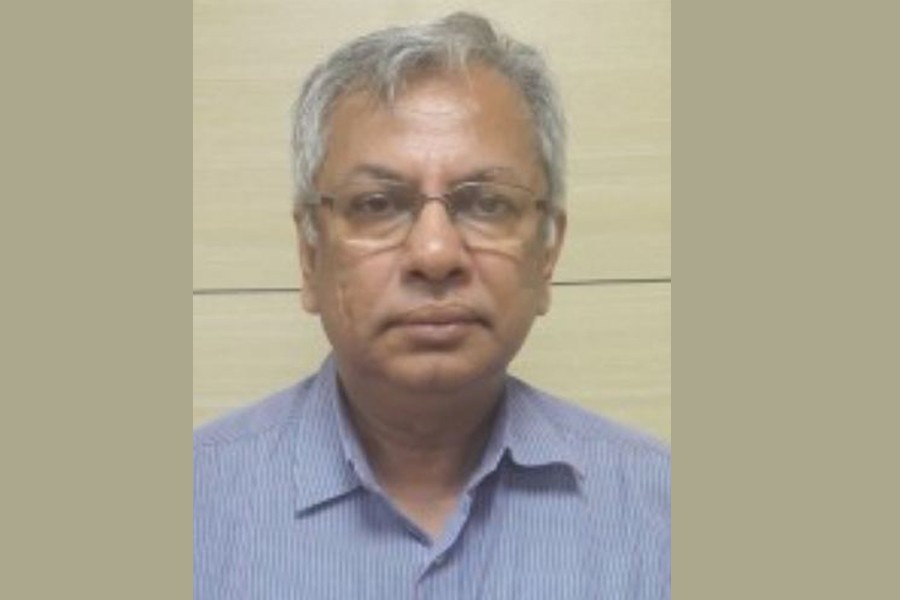Coronavirus is going to change the way we do things in our society- from handshake to how we behave in public places. The social distancing, physical distancing to be accurate, is likely to stay until we find a cure for COVID-19.
All these will have a significant impact on how we engage in our economic activities to remain safe and free from the coronavirus (COVID-19).
Economist Dr AK Enamul Haque made these observations in an interview with the FE this week.
He opined that economy of Bangladesh will shrink due to negative impact of COVID-19 but it will also bring some new opportunities for the country for which we should be prepared.
“If we can reorganise our economic activities with proper planning, Bangladesh should get back to normalcy within six months,” he said with optimism.
Dr Haque, a professor of economics at East West University was of the view that in the current fiscal year, growth rate of the Gross Domestic Product (GDP) should stay around 6.0 per cent because the country had nine months of normalcy since July 2019.
“Next year, if we get back to work by July, then we should be alright,” he added.
The economist stressed on reduction of density of population in transports, factories, offices, education institutions, hospitals, and even during voting as a core strategy to deal with impact on the coronavirus.
He also pointed out that some changes have already taken place in this connection.
“Some services are already home-based and it should continue as this will reduce need for travelling and pressure on transport system,” he explained.
He also suggested re-location or new branches of schools in locality so that students do not need to use transports and walk to their schools.
“Class size should be halved to maintain distance inside the classes. Higher education should use online and face-to-face system simultaneously using flipped-mode and reduce class size to half,” he said.
Mentioning that telemedicine is a choice for health sector he also suggested that service hours for outdoor patients in hospitals and diagnostic centres need to be increased to reduce density of clients.
Enamul Haq was of the view that manufacturing sector should either increase their floor space or reduce their number of workers.
“Most retails should move to online and use home delivery system using apps or phone and those unable to do so have to ensure distance between clients at their own costs,” he opined.
“Counter based services like banks, ticketing and retail shops should use both online or mobile systems and a limited face-to-face system where distance must be maintained,” he added.
Dr Haque, also director of Asian Centre for Development, opined that if relocation of schools, push knowledge-based activities to home and online and enhance retail trade to online, then public transport will face less crowd.
“Number of seats should be half on buses, water transports, and trains,” he suggested.
The researcher also pointed out that agricultural works can continue as is because there is no crowding issue in agriculture fields.
“However, wholesale markets in rural areas must move to open fields to disperse crowds and open-air retailers should move to open fields instead of standing around roads and highways,” he added.
Dr Haque favoured turning all financial transactions mobile-based by discouraging notes and coins.
“It will increase transparency of transactions, reduce bribes as electronic transactions can be traced. It will also reduce leakages in collection of tax and Value Added Tax (VAT),” he explained.
He thought that most of the government offices should use online portal to provide services to public and collect bills/payments. “Like 999, the Ministry of Public Administration may introduce 888 or similar line to track public complaints against any online services,” he added.
Highly relying on information technology, Dr Haque also believed that app for contact tracing of adult working persons is a good option to reduce future COVID crisis.
The economist also favoured gradual relaxation of lockdown, imposed in the form of public holidays, for the selected sectors.
“If it is not done quickly, Bangladesh is plunge into a deep crisis,” he added.
Expressing optimism that agriculture will recover soon, he said: “Manufacturing will also recover quickly if we place all the rules and maintain it. The important issue is to ensure rules are followed so that COVID19 does not recur.” “Meantime, we should strengthen our health facilities to deal with it and more investments are needed for the health sector,” he added.
To support the poor in this crisis, Dr Haque preferred ration cards based on voter-list than distributing food haphazardly. “Individuals should report their current location to the nearest local Councillor /UP office using online system to receive ration benefits,” he explained. “The system should be linked to NID database to avoid misappropriation.”
The academic also argued that the government should let the working population go back to work quickly.
“The urban poor are in a bigger trouble because they have to pay for food, housing, education, health, fuel, water, and electricity regularly,” he explained. “With economy on hold, it will bring disasters.”
He also stressed on monthly allowances during the general holidays for the urban poor who are affected in terms of jobs or income due to closure.
“All monetary payment should use online payment vehicles to ensure traceability,” he added.


